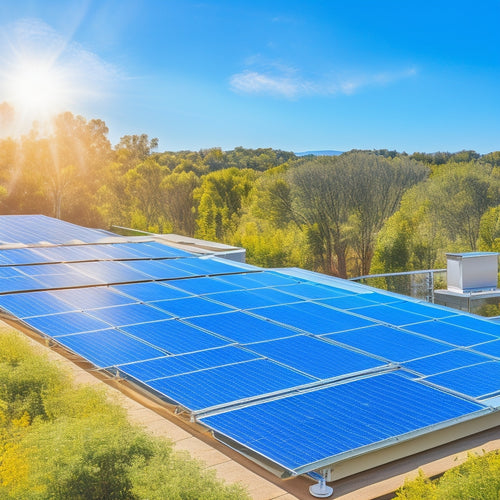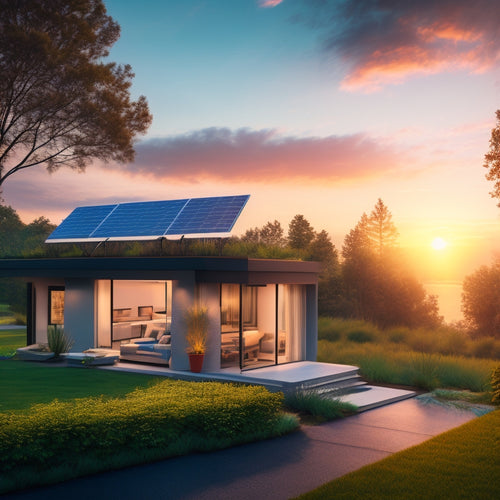
Best Home Solar Panels for Your Budget
Share
To find the best home solar panels for your budget, consider initial costs, efficiency ratings, and potential savings. Look for panels with efficiency ratings above 15% for peak performance. Monocrystalline panels offer higher efficiency but may cost more, while polycrystalline panels are more budget-friendly. Evaluate your energy needs through an energy audit to match the solar system with your consumption patterns. Don't forget about available rebates and tax incentives that can greatly lower your upfront investment. Understanding these factors will guide you to an economical choice, and there's plenty more to investigate as you assess your options.
At a Glance
- Assess initial investment costs and explore financing options to make solar panels more affordable for your budget.
- Look for rebate programs and tax incentives to reduce installation expenses and enhance your return on investment.
- Choose solar panels with efficiency ratings above 15% to maximize energy capture and long-term savings.
- Conduct an energy audit to understand your consumption patterns and select solar solutions that align with your energy needs.
- Partner with reputable installers to optimize performance based on your roof's orientation and shading conditions.
Cost-Effective Energy Solution
When considering home solar panels, it's essential to weigh your initial investment against the long-term savings they can provide.
Solar panels can reduce energy costs by 50-75%, allowing homeowners to save greatly on their annual energy bills.
By analyzing installation costs and available incentives, such as financial benefits, you can make a more informed decision.
Ultimately, the shift to solar not only helps your budget but also contributes to a sustainable energy future.
Initial Investment Considerations
Although the initial investment in home solar panels can seem overwhelming, it's crucial to recognize that this upfront cost is often offset by long-term energy savings and potential incentives.
To make solar energy more accessible, there are various financing options available. These options can help you spread the cost over time, making it easier to manage your budget while enjoying the benefits of renewable energy.
Many homeowners are unaware of the numerous rebate programs that can greatly reduce the cost of installation. These programs may come from federal, state, or local governments, as well as utility companies.
By taking advantage of these rebates, you can lower your initial outlay and enhance the return on your investment.
Investing in solar panels isn't just about the initial cost; it's about gaining energy independence and freedom from fluctuating utility rates.
The right financing options and rebate programs can change what seems like an overwhelming expense into a smart, sustainable choice for your home.
Don't let the upfront investment discourage you—consider the long-term benefits and the financial assistance available to help you pave the way toward a brighter, more independent future.
Long-Term Savings Potential
Access the potential for considerable long-term savings by investing in home solar panels. With the right approach, you can achieve energy independence while reducing your monthly utility bills.
Take advantage of tax incentives and local rebates that can considerably lower your initial costs. Investigate financing options that allow you to spread payments over time without straining your budget.
Consider installation timing; installing when demand is low can cut costs. Plus, with technology advancements in solar efficiency, your system will likely perform better and require fewer maintenance costs over its lifespan.
Look for products with strong performance warranties to guarantee you're protected against any unexpected issues.
Stay informed on market trends, as solar energy continues to gain traction and prices are steadily decreasing. A grid connection can provide backup power, but going solar means you're less reliant on fluctuating energy prices.
By investing in solar panels, you're not just making a cost-effective choice; you're investing in your freedom from rising energy costs and contributing to a sustainable future.
Make the decision today to utilize the sun's power and reveal your savings potential!
Sustainable Energy Source
Switching to solar panels not only reduces your carbon footprint but also contributes to a cleaner environment.
By capturing the sun's energy, you can save considerably on utility bills over time, making it a financially smart choice.
Additionally, with various financial incentives available, the initial investment in solar power can be offset by potential long-term savings.
Embracing this sustainable energy source helps secure a more stable and eco-friendly future.
Environmental Impact Benefits
Utilizing the power of the sun offers an extraordinary opportunity to reduce your carbon footprint and promote a cleaner environment. By choosing home solar panels, you're not just making an investment in your property; you're actively participating in the shift to renewable resources.
Solar energy is one of the most sustainable options available, providing a consistent source of power without the harmful emissions associated with fossil fuels.
When you capture solar energy, you're greatly cutting down on greenhouse gases and other pollutants that contribute to climate change. This reduction in your carbon footprint is essential for future generations who'll depend on a healthier planet. Each kilowatt-hour generated from solar panels translates into less reliance on non-renewable energy sources, making a tangible difference in the fight against environmental degradation.
Moreover, solar technology continuously evolves, making it more efficient and accessible. By opting for this clean energy source, you're not only equipping yourself with energy independence but also helping to drive demand for sustainable practices.
In doing so, you contribute to a collective movement toward a greener future where renewable resources take center stage. Welcome the freedom that comes with solar energy and its environmental benefits today.
Long-term Cost Savings
Investing in home solar panels not only contributes to a greener planet but also offers considerable long-term cost savings. When you utilize solar energy, you reduce or even eliminate your monthly electric bills, freeing up funds for other pursuits. Over time, the savings can exceed the initial investment, especially as energy prices continue to rise.
Many homeowners benefit from incentive programs that can lower upfront costs. Federal and state tax credits, rebates, and performance-based incentives can greatly enhance your return on investment. By taking advantage of these programs, you can offset the cost of installation and accelerate your savings timeline.
Additionally, financing options like solar loans and leases make it easier to go solar without a hefty initial payment. These flexible solutions allow you to pay for your system over time, often with monthly payments that are less than your previous electric bills.
In the long run, solar panels not only enhance your energy independence but also provide financial stability and peace of mind. By choosing solar, you're not just making a financial decision; you're investing in your freedom from rising energy costs.
Panel Efficiency Ratings
When choosing solar panels, understanding efficiency ratings is essential to maximizing your investment.
These metrics reveal how well different panel types convert sunlight into usable energy, allowing you to make informed comparisons.
Higher efficiency ratings typically indicate a greater energy capture per unit area, making them ideal for limited spaces higher efficiency benefits.
Knowing these details can help you select the most effective solution for your energy needs and budget.
Understanding Efficiency Metrics
Understanding the efficiency metrics of solar panels is essential for making an informed decision that aligns with your energy needs and budget. The efficiency rating indicates how effectively a panel converts sunlight into usable electricity, which directly influences your long-term savings and energy independence.
Here's a quick overview of key metrics to evaluate:
| Metric | Description |
|---|---|
| Efficiency Rating | Percentage of sunlight converted to electricity |
| Temperature Coefficient | Impact of temperature on performance |
| Performance Degradation | Rate at which efficiency decreases over time |
| Warranty Period | Duration a panel is guaranteed to perform at a certain level |
| Solar Cell Technology | Type of technology used, affecting efficiency and cost |
When choosing solar panels, reflect on how solar cell technology impacts efficiency ratings. Higher-efficiency panels may cost more upfront but can yield greater energy savings, especially in areas with limited roof space. Keep an eye on performance degradation, as panels lose efficiency over time. Understanding these efficiency metrics will enable you to select the best solar panels that cater to your freedom and budgetary goals.
Comparing Panel Types
Choosing the right solar panel type can greatly impact your energy production and long-term savings.
Monocrystalline panels offer significant advantages, including higher efficiency and better temperature performance, making them ideal for maximizing your energy output in limited space. However, they often come with a higher price tag.
On the other hand, polycrystalline panels have some drawbacks, such as lower efficiency and a less appealing aesthetic. If you're not concerned about aesthetics and want to save upfront costs, they may still be a viable option.
Thin film technology provides flexibility in installation and can be integrated into various surfaces, but it typically has lower efficiency ratings and shorter warranties.
When comparing brands, consider their warranty options and reliability, as these factors can impact your long-term investment.
Ultimately, your choice should align with your energy needs, budget, and aesthetic preferences.
Whether you prioritize monocrystalline efficiency, polycrystalline affordability, or thin film versatility, understanding each type's pros and cons will enable you to make an informed decision that enhances your energy independence and freedom.
Selecting Based on Energy Output
To choose the right solar panels, start by evaluating your energy needs.
Understanding your household's consumption patterns will help you match panel efficiency ratings with your requirements.
Additionally, conducting an energy audit can reveal energy-intensive appliances and help identify areas for improvement in efficiency, ensuring you invest in a system that maximizes energy output and fits within your budget.
Energy Needs Assessment
Evaluating your energy needs is essential for selecting the right home solar panels that fit your budget and lifestyle. To make an informed decision, start by appraising your energy consumption patterns. This will help you identify how much energy you need and which solar panel types can meet those demands.
Here's a simple breakdown of common energy-consuming appliances and their average usage:
| Appliance | Daily Consumption (kWh) | Monthly Consumption (kWh) |
|---|---|---|
| Refrigerator | 1.2 | 36 |
| HVAC System | 3.0 | 90 |
| Water Heater | 3.5 | 105 |
| Lighting (LED) | 1.5 | 45 |
| Washer/Dryer | 2.0 | 60 |
Panel Efficiency Ratings
When selecting solar panels, understanding their efficiency ratings is essential for maximizing your energy output. Efficiency ratings indicate how well a panel converts sunlight into usable electricity, and higher ratings generally mean more energy produced for your investment.
To find the best fit for your home, evaluate the performance metrics of various panels. Look for products with ratings above 15%, as these tend to deliver better long-term savings.
Installation considerations also play an important role in determining overall efficiency. Factors like roof orientation, shading, and panel placement can greatly impact energy output.
Even high-efficiency panels may underperform if not installed correctly. As a result, it's critical to partner with a reputable installer who understands local conditions and can optimize your system's performance.
Long-Term Savings Potential
Investing in solar panels greatly reduces your energy bills over time.
By capturing the sun's energy, you can generate your own electricity, cutting your reliance on expensive utility rates.
Over the years, these savings can add up, making solar an economically sound choice for your budget.
Energy Bill Reduction
Many homeowners find that installing solar panels considerably reduces their energy bills over time. By utilizing the sun's energy, you can gain greater control over your energy consumption habits and protect yourself from rising utility rate trends.
Consider the following table illustrating potential savings over a decade:
| Year | Savings per Year | Cumulative Savings |
|---|---|---|
| 1 | $600 | $600 |
| 5 | $600 | $3,000 |
| 10 | $600 | $6,000 |
With such savings, you can invest in other areas of your life, enjoying financial freedom and peace of mind. The longer you use solar panels, the more you offset your initial investment, making it a smart, long-term strategy.
Additionally, by tailoring your energy consumption habits, you can maximize the benefits of solar energy. As utility rates continue to climb, your fixed energy costs from solar will remain stable. Embracing solar panels isn't just about saving money; it's about enabling yourself to break free from dependence on fluctuating energy prices and securing a sustainable future.
Frequently Asked Questions
How Do Solar Panels Affect Home Resale Value?
Solar panels enhance your home's resale value by increasing demand among buyers seeking energy efficiency. They lower utility costs and provide sustainable energy solutions, making your property more attractive in a competitive market. Welcome this investment!
Can Solar Panels Work During Cloudy or Rainy Days?
Even on cloudy or rainy days, your solar panels still capture light, though energy production decreases. Think of them as resilient sunflowers, thriving in less than perfect conditions, ensuring your home's solar efficiency remains steady.
What Maintenance Do Solar Panels Require?
Maintaining solar panels is essential for efficiency. You'll need regular solar panel cleaning to remove dirt and debris. Additionally, inverter maintenance guarantees peak performance. Stay proactive, and you'll enjoy the freedom of renewable energy for years.
Are There Financing Options for Solar Panel Installation?
Did you know over 80% of solar panel buyers use financing? You've got options like solar loans, leasing programs, and tax credits. Financing calculators can help you investigate energy savings and installation grants for your freedom.
How Long Do Solar Panels Typically Last?
Solar panels typically last 25 to 30 years, depending on durability factors like quality, installation, and maintenance. Investing in high-quality panels guarantees you maximize their lifespan, giving you energy independence and long-term savings.
Explore More
In the grand quest for solar panels that won't break the bank, you've unearthed a wealth of options! By choosing wisely, you're not just slashing your energy bills; you're practically printing money while saving the planet. With the right panels, you'll capture the sun's power like a wizard, turning your roof into a money-making machine! So, go ahead—make the leap into solar, and watch your savings soar higher than a rocket!
Related Posts
-

What Types of Solar Energy Devices Are Available
You'll find several types of solar energy devices available today, each customized to different energy needs. Photovo...
-
Average Lifespan of Solar Battery Banks
The average lifespan of solar battery banks generally ranges from 5 to 15 years. This variation mainly stems from the...
-

The Future of Residential Energy Storage
The future of residential energy storage looks promising and cost-effective for you. With lithium-ion battery prices ...

